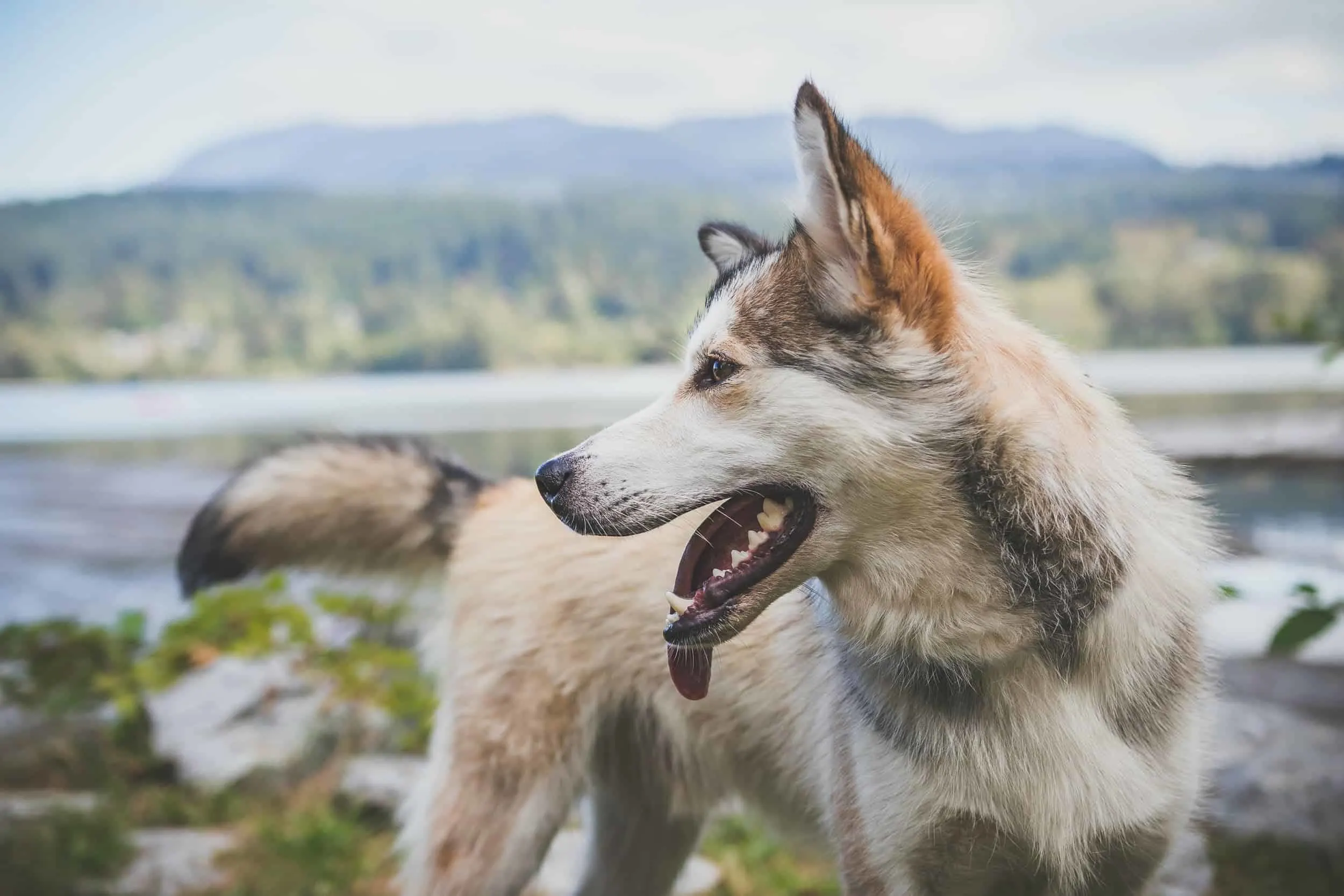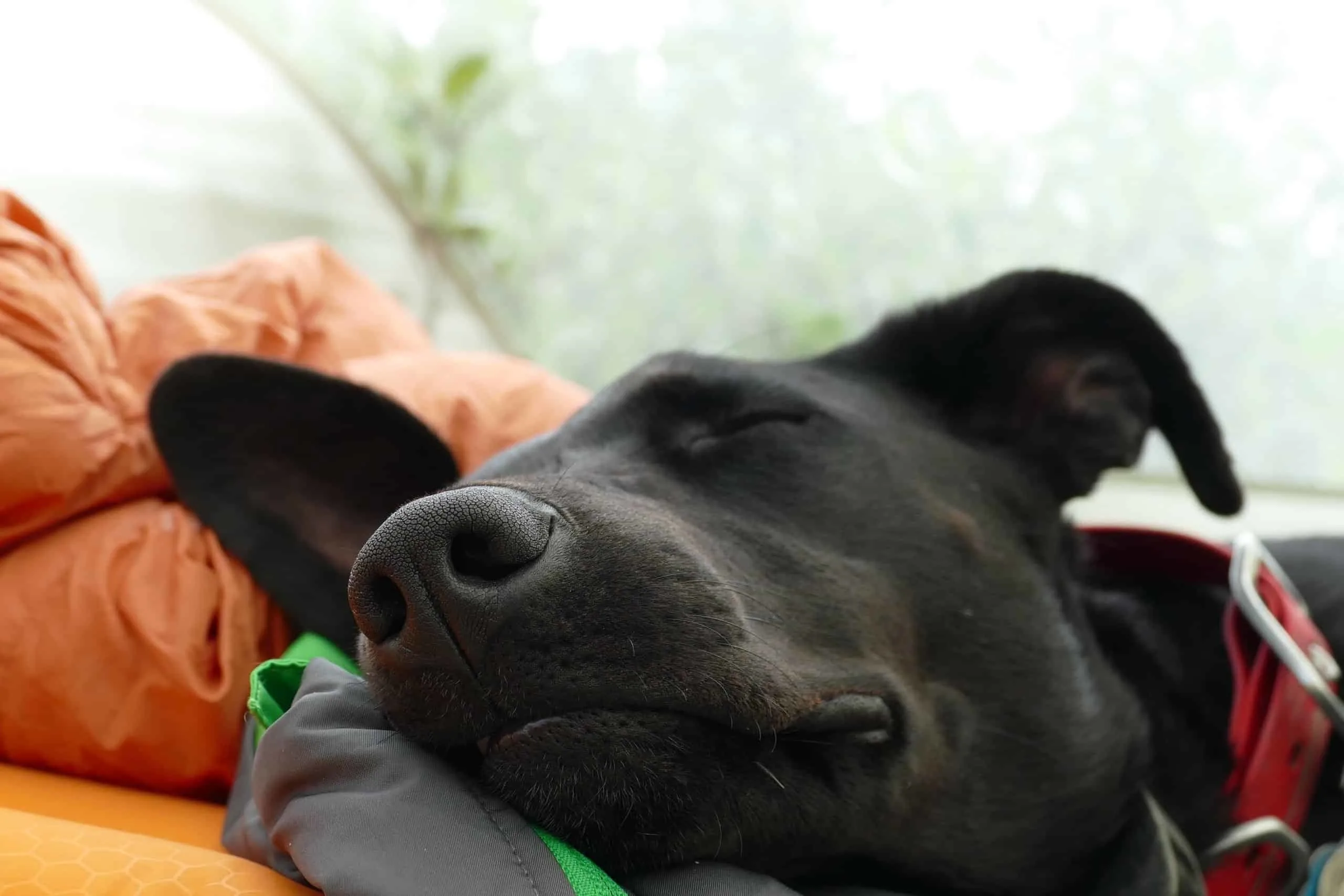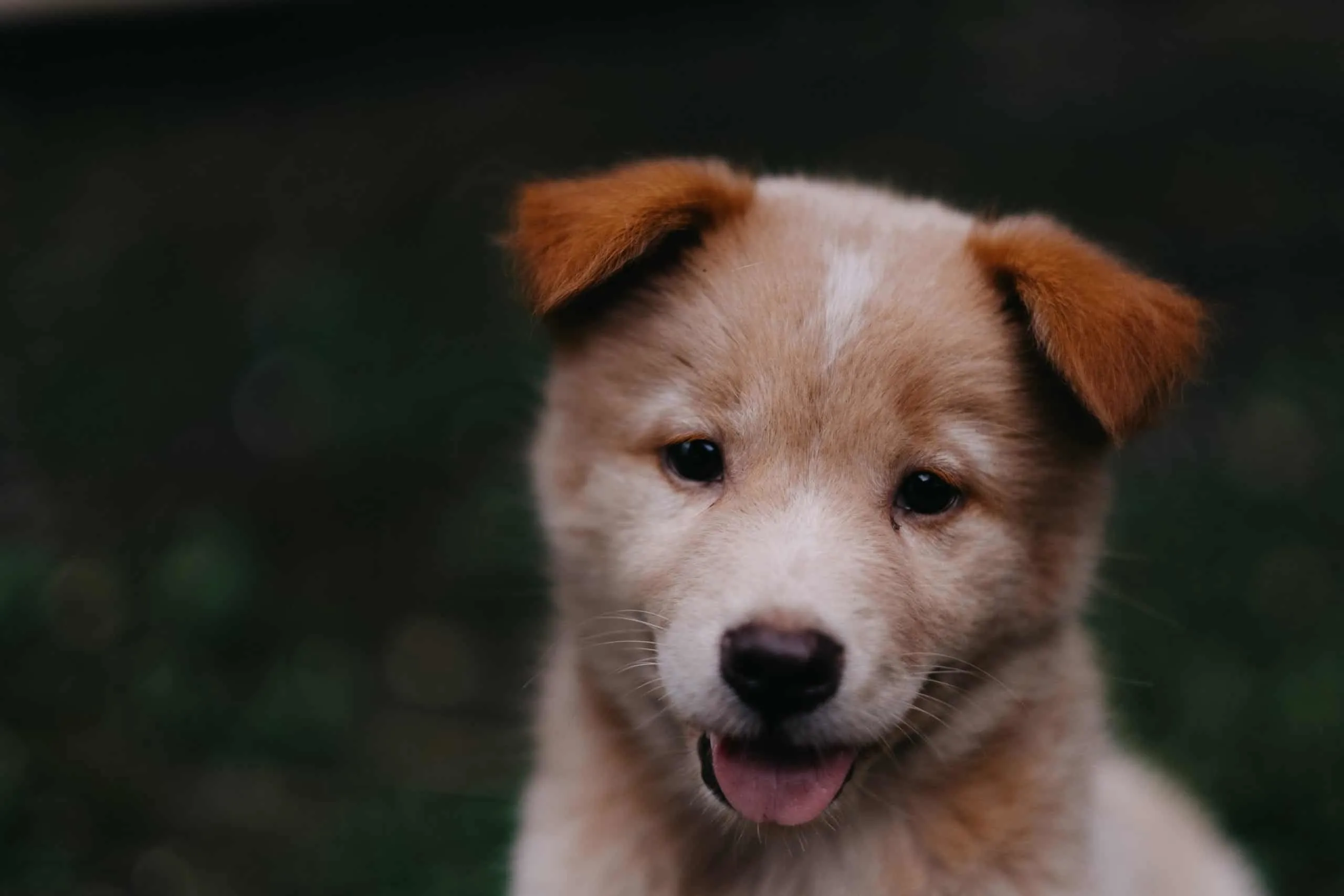When you think about heavy breathing in dogs, you probably see a dog that is vigorously panting after an extensive game of fetch.
It’s normal for dogs to breathe heavy and fast after extortion but what if your dog is just sleeping or hasn’t been outside yet?
Common causes of heavy breathing include stress, excitement, hot weather, anxiety, or just vivid dreaming.
Dogs with short snouts like the Bulldogs or Pug generally pant a lot louder and heavier compared to other breeds.
Rapid breathing in itself is not a disease but in some cases, it can be a symptom of a respiratory problem or other condition such as:
- Tachypnea
- Dyspnea
- Heat Stroke
- Heart Failure
- Poisoning
- Anemia
But how do you know if your dog is really breathing weird or just normal? And what should you do about heavy breathing?
How to Recognize Weird Breathing
Healthy, adult dogs typically take 10 to 30 breaths per minute, depending on their size.
A resting breathing rate over 35 to 40 breaths per minute is considered abnormal. Puppies generally breathe at a higher rate.
Knowing your dog’s normal breathing and panting, will make it much easier for you to recognize weird breathing patterns and changes.
Flat-faced breeds have narrow nostrils and elongated palates making them especially prone to developing breathing problems.
It’s normal for your dog to pant after exercise or from distress caused by separation anxiety or travel anxiety.
But if you can rule out any exterior factors and your dog is still breathing heavily even while sleeping or resting, it’s a cause for concern.
Abnormal breathing can be paired with one or several of the following:
- Excessive drooling
- Panting starts suddenly
- Accompanied by snorting or rasping
- Distress
- Choking
- Bluish tongue and gums
- Panting persists
It’s always necessary to call your vet if you notice abnormal breathing.
Common Causes of Heavy Breathing In Dogs
The most common, and non-life-threatening causes of heavy breathing in dogs are exercise, excitement, stress, fear, or heat.
Prolonged exposure in the sun or summer activities can quickly heat up your dog’s body.

Panting is primarily a temperature regulating mechanism and necessary to prevent your dog’s body from overheating.
It’s characterized by a wide-open mouth (often referred to as a smile), heavy breathing, and maybe even drooling.
Dogs don’t sweat as humans do and they only produce sweat around areas that are not covered with fur which are the paw pads and nose.
Brachycephalic breeds like the French Bulldog or Pekingese are prone to heavy breathing due to their short snouts and will pant much quicker in hot weather.
But heavy breathing can also be the symptom of more serious underlying diseases.
Tachypnea
Tachypnea is a condition that is characterized by rapid and shallow breathing.
There are many, many underlying illnesses that could cause an increased breathing rate like lung diseases, heart diseases, or soft palate disorders.
In most cases, this type of heavy panting occurs due to overexertion, hot weather, or stress.
If you have ruled out all environmental factors and your dog is still having trouble breathing, a vet visit will be necessary.
Besides breathing difficulties or coughing, your dog might also experience other symptoms including vomiting, blue gums, fatigue, and excessive thirst.
The treatment method depends on the underlying cause but it should be supported by symptomatic therapy.
A change in routine or training in the case of separation anxiety may be needed to reduce your dog’s amount of distress.
Although Tachypnea is not a critical condition, it can quickly progress to Dyspnea which can be life-threatening.
Dyspnea
Dyspnea (respiratory distress) is used to describe labored breathing and shortness of breath.
The breathing difficulty can range from mild and temporary to serious and permanent.
If you have ever heard the term “air hunger” you will know how your dog is feeling when trying to breathe but still not getting enough air into his lungs; it’s an uncomfortable feeling of breathlessness.
Possible causes are accumulation fo fluid in the lungs (edema), heart failure, lung disease, or trauma.
Dogs with short snouts (brachycephalic breeds) like the Pug, Boston Terrier or Boxer have an anatomic predisposition to respiratory problems.
Coughing, shortness of breath, and fatigue are all symptoms to look out for.
There are many diagnostic tests that can be performed to determine the underlying cause so the right treatment can be determined.
A chest radiograph helps identify any fluid accumulation in the lungs while an EKG shows the electrical activity of the heart.
More invasive methods may need to be done if the previous tests haven’t shown any results.
Biopsy of the lungs provides insight into possible lung lesions or tumors that would need to be surgically removed.
Therapy is then used to improve heart function and prevent the accumulation of fluid in the lungs.
Dyspnea prevents your dog from getting enough oxygen into his bloodstream, meaning that it’s a life-threatening emergency and will require immediate medical attention.
Heat Stroke
Heatstroke is a result of prolonged exposure to or physical exertion in hot weather.
It’s the most severe form of heat exhaustion and leads to loss of consciousness or even organ failure.
If your dog has been laying or exercising in the sun for too long, he may experience heavy breathing, excessive drooling, fever, blueish gums, or vomiting.
Any signs of sickness shouldn’t be ignored and your dog needs to be removed from the sun.
Get your dog inside immediately and let him lie on a cooling mat or the floor. Wet your dog with cool (not cold!) water; if you have a small dog or puppy use lukewarm water.
Pay special attention to the paws and ears to keep your dog from overheating.
It’s always useful to have a pet thermometer on hand to check your dog’s temperature every few minutes.
You can put your dog in front of a fan to dry and cool off completely. Once his temperature has dropped to 103 °F, you can stop applying water.
Provide your dog with small amounts of water and immediately call your vet even if your dog is getting better.
He could still suffer from kidney failure or other serious complications.
Heart Failure
Heart failure (CHF) is a condition that can occur as a result of a heart disease that slowly developed over time.
The heart is unable to pump a sufficient amount of blood to the body, causing fluid accumulation in the lungs.
Most commonly, congestive heart failure presents by persistent coughing and difficulty breathing even while resting.
Your dog won’t have the stamina of a healthy dog and will quickly tire out from exercise.
Fluid build-up leads to a swollen belly and a crackling breathing noise. Other symptoms include lack of appetite, pacing, weight loss, and blueish gums.
These signs can vary depending on whether your dog has right-sided or left-sided CHF.
Eventually, they both lead to oxygen depletion in the tissue causing the heart to fail.
About 80% of canine CHF cases are caused by mitral valve insufficiency. Heartworms, parvovirus, PDA, and atrial septal defect are among the other possible causes.
Blood tests, chest x-rays, and EKG are valuable diagnostic methods that are necessary to determine the underlying cause and the following treatment.
Unfortunately, treatment is primarily aimed to manage the symptoms as heart failure is not curable.
Surgery can be made to insert a pacemaker accompanied by medications to correct an irregular heartbeat.
A change in diet and his exercise regiment are ways to improve his life quality.
At home, you will need to regularly monitor his resting respiratory rate while keeping his stress level as low as possible.
Poisoning
Garlic and other members of the allium family such as onions contain thiosulfate which is highly toxic to dogs and can result in poisoning and anemia.
The symptoms include rapid breathing, lethargy, vomiting, abdominal pain, and dark-colored urine. It’s best to take your dog to the vet if he has ingested something toxic.
Onion and garlic poisoning are rarely fatal but your dog might need supportive care to fully recover.
Water intoxication is also very rare but it can happen especially in the hot summer months.
Due to high water intake, the sodium in the blood sinks to dangerous levels causing mild to severe complications.
It also presents with difficulty breathing, vomiting, lethargy, excessive salivation, and even seizures.
Water poisoning can develop really quickly so it’s necessary to take your dog to the vet for some blood tests.
Anemia
Anemia occurs when the number of red blood cells or hemoglobin concentration in your dog’s body is too low.
Causes ranging from autoimmune diseases to cancer or trauma can be diagnosed by several blood tests.
A healthy dog’s blood consists of 35% to 55% red blood cells. Any cell volume under 35% is considered anemic.
Anemia leads to pale gums, heavy breathing, weight loss, and lethargy.
Life-threatening cases of anemia are treated by blood transfusion which stabilizes your dog while the underlying cause is searched.
It’s always important to treat disease as quickly as possible for the best prognosis.
Dog Breathing Fast While Sleeping

Sleeping is the time of the day where your dog’s body resets itself. It consists of three stages, light sleep, deep sleep, and REM; similar to how our sleep cycle looks.
Resting and napping are usually connected to a deep and relaxed breath so it’s completely understandable that you are worried.
Fortunately, your dog’s fast breathing while sleeping most likely has a benign cause.
Did you know that dogs can experience nightmares and exciting dreams just like we do?
You have probably seen your dog acting out one of his dreams before by twitching or paddling with his paws.
During REM, your dog can start breathing faster as a result of a very active dream.
This breathing anomaly should only last for a few seconds at a time. Your dog should feel well-rested and overall happy and healthy after his nap.
Puppies in general have a faster respiratory and heart rate which should normalize with age. Also, smaller breeds tend to breathe faster than their bigger counterparts.
If you want to be sure, you can take a stopwatch or your phone and count the breaths your dog is taking in one minute.
As I have said above, a normal breathing rate ranges from 10 to 30 breaths per minute depending on your dog’s breed, size, and age.
You can also use a thermometer or measure his pulse to further evaluate his overall health.
If the rapid breathing is persistent and occurs very often accompanied by other symptoms, you should definitely take him to the vet.
Dog Breathing Problems Home Remedies
If you suspect that your dog is suffering from respiratory problems, always call your vet first before you try anything at home.
There are a few home remedies that you can try to make your dog’s life easier when he is experiencing heavy breathing, panting or coughing.
1. Temperature
First, you should check the temperature in your house and specifically where your dog sleeps using a thermostat.
A hot bedroom would get anyone sweating especially large and flat-faced breeds.
2. Cooling Mat
Provide your dog with a cooling mat during the summer months. This will help him regulate his body temperature to prevent overheating.
I can highly recommend the Arf Pets Self Cooling Mat as it’s non-toxic and very durable.
3. Honey
Honey, especially manuka honey, is great for soothing the throat and relieves coughing.
It has antibacterial, anti-fungal, antiviral, and anti-inflammatory properties. You can feed your dog half a to one teaspoon of raw honey for every 30 lbs.
The taste is usually loved by all dogs so you won’t have a problem giving him this sweet medicine. Adding dandelion will transform it into a vitamin-rich snack.
4. Humidifier
A dry interior can make your dog prone to breathing problems and promotes coughing.
Humidifiers, like the Magictec Cool Mist Humidifier, are great home remedies for dogs that have caught a cold and could benefit from moisturized airways.
Place it near your dog’s bed or in the room where he spends most of his time. If you would like to add some essential oils, make sure that they are safe for your pet.
Non toxic essential oils include chamomile, peppermint, ginger and lavender.
Add one or two drops to your humidifier, let it run for 10 minutes and subsequently let the air clean for 30 minutes.
5. Coconut Oil
Coconut oil is a natural superfood which I swear upon. I feed it my Rottweiler nearly everyday and it would take me forever to list all the benefits.
Regarding breathing problems, coconut oil is a immune system booster and helps with contagious diseases like kennel cough.
Together with honey, it forms a super bomb that effectively fights infections.
You can add one to two teaspoons for every 10 lbs to your dog’s meal. If your dog has never tried coconut oil before, you can start with a smaller dosage and slowly increase it.
How Do You Calm a Heavy Breathing Dog?
Every dog is different, some are the most mellow and calm companions and others jump up from the slightest sounds.
This could be due to trauma, lack of socialization, or poor breeding.
It’s very important to radiate calmness when your dog is in a state of anxiety and breathing heavily.
Show him that you are calm by breathing slowly and deeply while blinking softly with your eyes.
Your dog is able to pick up on these cues which hopefully relieves a bit of stress.
If your dog is surrounded by an immediate stressor, take him away from that situation to a quiet and safe room that he is familiar with.
Resist the urge to comfort and pet your dog when he is showing signs of fear and anxiety. Affection is always reinforcing and shows him that his fears are justified.
Instead, distract him from what is happening. Let him do basic obedience commands that he has done a thousand times which provide a sense of normalcy.
When a dog is afraid, he wants to retreat into a safe spot. This could either be his crate or dog bed. Now to make it really comfortable, I recommend the PetFusion Orthopedic Dog Bed.
It’s soft, has a lounge-like feeling, and promotes your dog’s joint health and mobility. If you have a real chewer, head over to my guide on the best chew proof dog beds for 2020.
If your dog constantly struggles with fear-induced heavy breathing, take him to the vet to rule out any health issues.
How to Prevent Heavy Breathing In the Future
Unfortunately, underlying conditions such as heart failure or anemia can hardly be prevented.
However, regular health checks enable early diagnosis thus providing for a better prognosis overall.
A healthy diet with sufficient exercise and a low amount of stress promotes a long lifespan.
On the other hand, a heat stroke is perfectly preventable with a few safety precautions. Never leave your dog inside the car and restrict prolonged exposure to the sun.
Your dog should stay in the shade most of the time and water always needs to be available.
I like to keep my dog’s paws wet and cool so we only choose to walk close to a river or she can have a bit of fun with the hose.
Try to only walk your dog in the cooler hours of the day, meaning only in the morning, evening, or night. One indication is the temperature of the asphalt.
Place your hand on the street and if you cannot leave it there for at least 5 seconds, the ground will be too hot for your dog’s sensitive paw pads.
Poisonings can be prevented by restricting any access to toxic foods. Those include avocados, garlic, chocolate, grapes, etc.
Human food, in general, isn’t a good option for dogs, especially foods that have been cooked with oil and spices.
Table scrapes can easily cause gastronomical upset and are teaching your dog the bad habit of begging during meal times.
Fast Breathing in Puppies

Puppies, in general, breathe faster than adult dogs as their bodies are growing at a high rate.
They can become really heavy breathers when they sleep which is a phenomenon often seen in human infants.
But puppies are also more susceptible to respiratory diseases because their immune system is not yet fully developed and they are more prone to fluid accumulation in the lungs.
Monitor your puppy’s overall health and call your vet if you suspect a real issue behind the rapid breathing.
